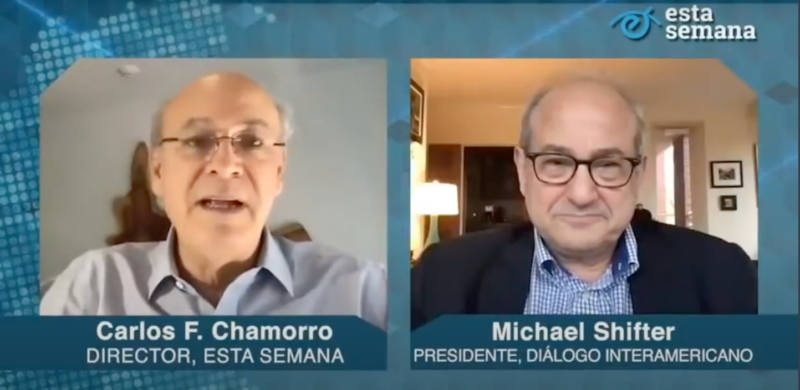What can we expect of Nicaragua now?
This post is also available in: Español
 Esta Semana / Confidencial
Esta Semana / Confidencial
Michael Shifter participated in an interview with Carlos Chamorro, José Manuel Vivanco, and Luis Solis for Confidencial where they discussed the latest issues related to Nicaragua. Specifically, the effects of the recent OAS vote, the possible suspension of Nicaragua from CAFTA, and the impacts of the approval of the Renacer Law. Shifter also addressed the international community's democratic pressure on Ortega and commented on how the US-Nicaragua relationship might look like.
COMMENTS BY MICHAEL SHIFTER:
(Question) Q: At the OAS Assembly of Foreign Ministers, 25 governments declared the Nicaraguan elections without legitimacy, with seven abstentions and Nicaragua voting against. How do you assess this resolution, and what impact could it have on a hardened authoritarian regime such as Ortega’s?
(Answer) A: I think it is an encouraging, very important step, which comes a little late, by the way, because this is something they should have done long ago, given the democratic deterioration in Nicaragua, but they finally did it, and 25 votes is a resounding vote, which in my opinion, reflects a significant change in the Latin American opinion with respect to the dictatorship in Nicaragua, and lays the groundwork for future actions. With that resolution, I imagine that they are going to send a Permanent Council mission to evaluate the situation in Nicaragua and based on that, decide if they are going to activate the Democratic Charter, which I hope they will do.
[...]
Q: This week, President Biden passed the Renacer Act, which among other issues, talks about US scrutiny of multilateral loan agencies, coordinated sanctions with other governments, and Russia’s intervention in Nicaragua. What priorities will Biden adopt in terms of the implementation of this law?
A: I think there is going to be a strong debate within the Administration. On the one hand, some want to take a very tough position with respect to taking a big gamble against the dictator in Nicaragua and applying all kinds of economic pressure, and influencing the banks not to continue lending and supporting the Ortega regime, but on the other hand, others are going to say: we have to assess what impact these measures are going to have, and how they affect the Nicaraguan population, which is already suffering a humanitarian crisis, and also what impact it will have on the migratory flows from Nicaragua to Costa Rica, but especially towards the north, towards the border with the United States which, as we all know, is already a fundamental problem for the Biden Administration, and I think that some opinions will be cautious so as not to run the risk of aggravating a situation on the border, which is already very complicated.
Q: In the labor sector, and among Nicaraguan and Central American businessmen, there is concern about the economic and social effects that an eventual suspension of Nicaragua from Cafta (Central American Free Trade Agreement) could have. The Renacer Act speaks of a review. Within this range of options that are contemplated, what is the assessment in relation to the Cafta issue?
A: That tool is another instrument that the United States has at its disposal, but I believe that the same discussion is going to arise. What does it really mean to withdraw Nicaragua from CAFTA? What impact will this arrangement have, first of all, what economic impact, not only on businessmen, but also on the people who have jobs that depend on this. Many jobs would be lost, and this has to be assessed, and secondly, even if this impact is acceptable or manageable, what impact will it have on the dictatorship, the political survival of Ortega, and of the Government, because if it worsens the situation of Nicaraguans, and drives migration, but has no impact on Ortega, I think there will be people that say: wait a minute, we should not have gone for that option.
[...]



















